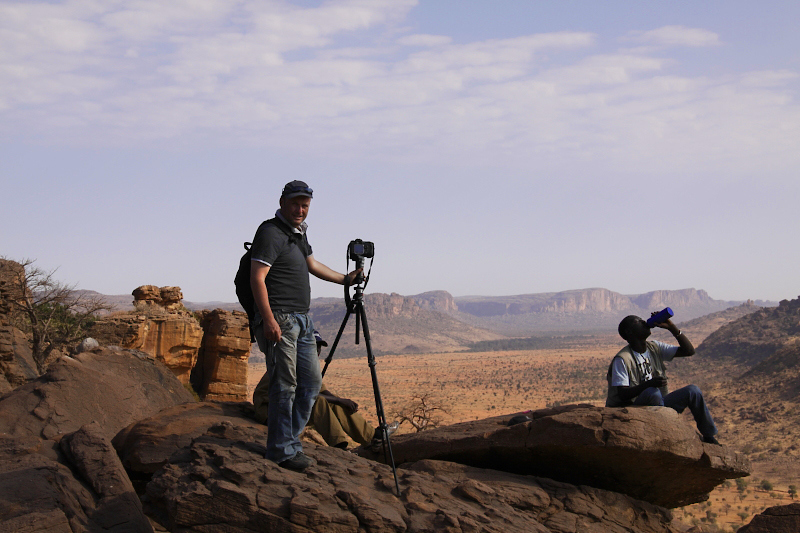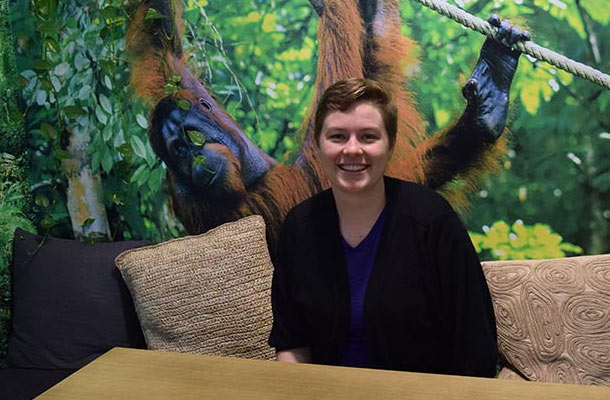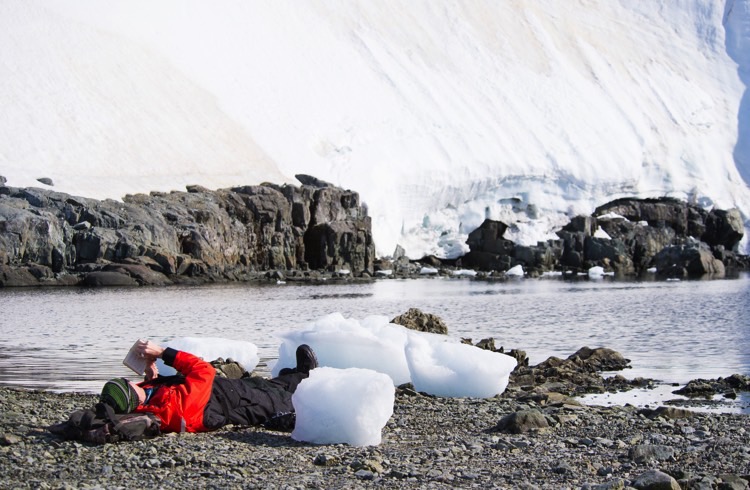We catch up with the lucky winners of our 2016 Travel Writing Scholarship to find out what they learned on their road trip Down Under, and tips from their mentor – Lonely Planet’s Anthony Ham.
Shares
 Photo © Anthony Ham
Photo © Anthony Ham
If you’ve just returned from a trip, opened your laptop to a blank word document, and immediately found yourself battling a case of writer's block, these tips from first-time travel writers should help you get started.
- Allison's Travel Writing Lessons Learned
- Mackenzie's Writing Tips
- Nainaa's Travel Writing Questions Answered
Meet Allison Bradley

I sat down for a three-day seminar with Lonely Planet author and freelance travel writer Anthony Ham, where I got the opportunity to pick his brain for the finer details of how to make a mark on an industry that seems to be harder and harder to break into.
Here are a few practical tips for anyone looking to take the plunge, but are feeling a bit unsure of how to get started.
1. Particular editors will print certain types of articles.
Be aware of details like content type, word count, and paragraph formatting, then write an article specifically targeted to that editor's preferences. Look for the type of phrases that crop up. How formal or casual are the articles? Does this publication allow for "they" to be used as a singular? Do they allow articles which use "you", or "I", or do they prefer something less personal?
2. Submit two or three articles at a time.
An editor is more likely to find something that catches their eye if they have a few options to choose from.
3. Hold on to your articles until they are timely.
If you want to write about a spring festival in Malaysia, don't submit it in the middle of summer when it's not timely.
4. Make connections.
A lot of people in the business won't be interested in helping someone new, but if you're lucky, you'll find someone here or there who will be willing to help you get your foot in the door.
5. Get as much information from each trip as you can.
Take photos of everything you want to remember. Record audio so you can recall what it sounded like. Interview anyone who might be useful to you later. Write down your experience in detail. At the end of the day, this is what will eventually bring it back to life for your reader.
Meet Mackenzie Griffith

There are many rules and guidelines and tips and tricks out there for getting travel writing published, and they are all applicable at some point.
Here are the top 10 things I learned while on assignment in Australia:
1. Write down three scenes
At the end of each day, write down at least three scenes. For each scene, write at least three distinctive adjectives. You, of course, won’t use all this material, but it serves as a skeleton should you need to flesh it out.
2. Take pictures and sound grabs to remind yourself later
I found it useful to use my phone to take quick photos to serve as reminders of the atmosphere, and to catch audio recordings of my surroundings to help place me back in that spot later when I'm writing.
3. Bring a notebook
I always had a small notebook to jot down small details that are easily forgotten or to remind myself to look something up later.
4. Plan what you want to see
Plans made it easier for things that require a reservation and also helped me frame the right questions so I knew what to ask.
5. Narrative arc
When you finally get home and are able to sit and write, remember that every story needs a beginning, middle, and end – a narrative arc.
6. Cultivate your voice
Cultivate your voice in these stories; it is your voice that is unique.
7. Sense of place
Travel is about a sense of place. This needs to be shown through a snapshot of words, with nothing extraneous. Evoke feelings with a sense of action, not just description.
8. Details, details, details!
It’s the unexpected, quirky details that will have the most impact.
9. Be concrete
Use language that is beautiful but concrete. Too much flowery language takes away a sense of action or realness. Every sentence should have a purpose to move the story along.
10. Give them what they want
The most important thing that I’ve learned as a writer is to give them what they want. Editors, publishers, your audience – they all tell you what they want. Sometimes you have to ask them first, but it’s not a secret. You might not always be writing exactly what you want to write, but you will be giving people what they want and that will keep them asking you for more. Eventually, you will have more pull in guiding people to what they don’t even know they want yet. And that’s where the true power of a writer lies.
Meet Nainaa Rajpaal

“A travel writing assignment?” cooed my friends, with eyes all rounded and unblinking. I couldn’t believe my luck. I was going on a 10-day Australian road trip, where my only job was to lap up the many adventures that lay in wait for me Down Under.
Being a first-timer, I was fortunate to have Lonely Planet’s Anthony Ham as a mentor. From his wisdom during my first trip, I’ve answered a set of questions that should be of help to most new writers.
1. How much do you need to plan before a trip?
While a lot of people prefer to just wing it, I say it bodes well to check for workshops, performances and free museum days before your trip.
Festivals make for great stories and give the city a whole new dimension, and are usually free to attend.
If you do have any places of interest, email the museum or event coordinators and tell them you’re a travel writer looking for a story. If you’re lucky, you might end up getting a private tour.
2. What do you need to do while you’re traveling?
I assumed that my thrilling travel experiences would be etched in my memory forever. Not surprisingly, I was wrong.
I soon found myself staring into the eyes of a soulless white page, chastising myself for not making my daily notes as Anthony suggested.
Carry a voice recorder and make your observations on the go, or simply leave it on at a crowded place to record ambient sounds that will inspire your writing.
3. How do you decide what to write about?
You could write about that 90-year-old elephant keeper in Kerala, or your upturned travel plans when a freak blizzard hit Japan.
Remember, it doesn’t even have to be dramatic – it could simply talk about your observations while walking down the crowded bazaars in Istanbul. The sharp smell of pepper flakes mingled with the mustiness of loosely hung carpets.
“Show, don’t tell,” says Anthony.
4. How do you sell your story?
The first thing you should do is shortlist a few publications that you think would be interested in the place you’ve visited. Read their last 10 features and find the formula. Yes, there’s always one. Do they all have a human story at its center? Perhaps they’re all informative. Or centered around food. Are they about 1,000 words each? Now send them an intriguing 100-word pitch that leaves a lot of questions unanswered. Suspense sells and always will.
Edited text, sub heads.Related articles
Simple and flexible travel insurance
You can buy at home or while traveling, and claim online from anywhere in the world. With 150+ adventure activities covered and 24/7 emergency assistance.
Get a quote

9 Comments
These are absolutely fantastic tips, and advice I wish I'd been given a year ago!
Congratulations on winning last years competition! It sounds like you had a great time and learned lots!
First of all, congratulations on winning last year's scholarship!
Thank you for your tips, they'll be very helpful.
I agree these are great tips for this hard to get into travel writing industry. What a wonderful opportunity and experience for you all. Thanks for sharing your knowledge here :)
Congrats and thanks for all the fabulous tips ..am going to try to put them into practice wherever I may be travelling to..soon.Hoping to be able to write a really good article worthy of publication someday...????
Great, different perspectives from each of you. Thanks for the tips!
Hi ladies, thanks for the excellent tips of breaking into this dreamy but difficult industry. All the best to you in your travel writing careers!
Happy International Women's Day!
Seems right that I should receive just the little bit of motivation I needed to continue typing away at this piece, from three quite wise and adventurous LADIES today. Thank you ????
Great tips! I am glad I read all of these insightful tips. They will help propel me forward as a passionate writer.
Hi I'm looking forward to a travel writing assignment ASAP :)